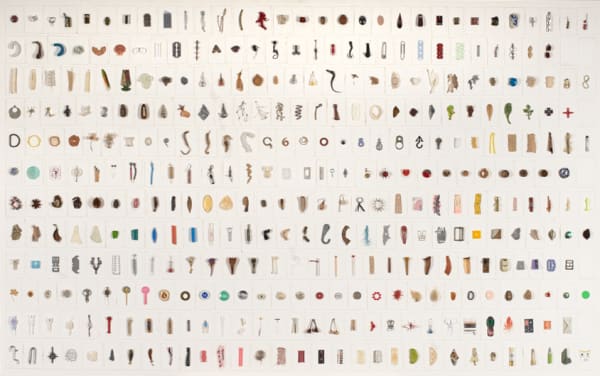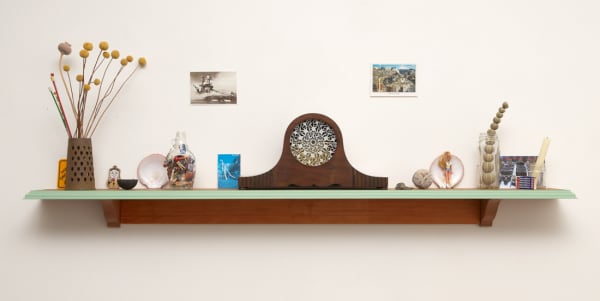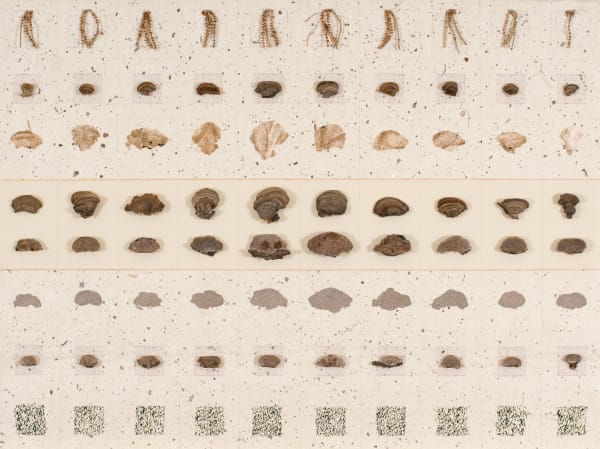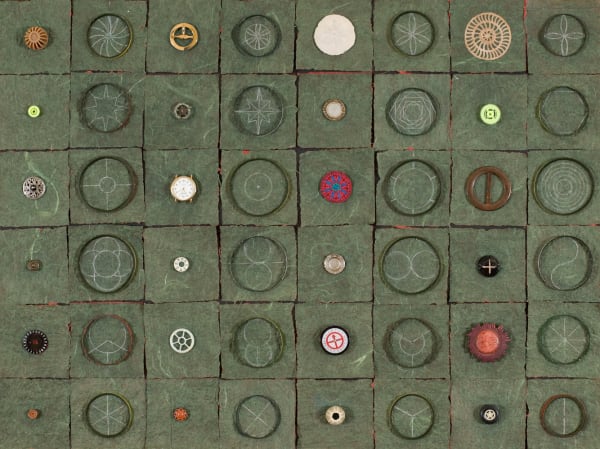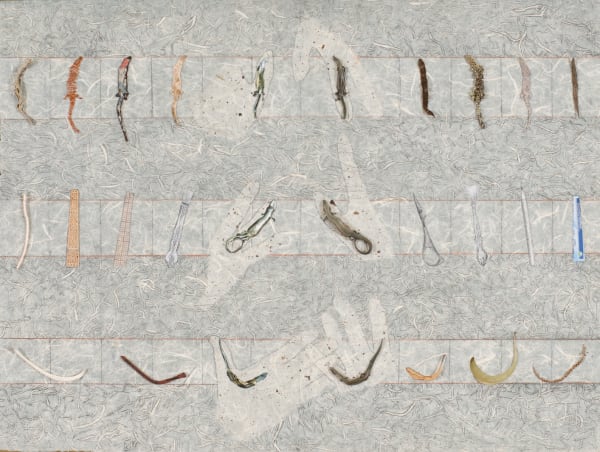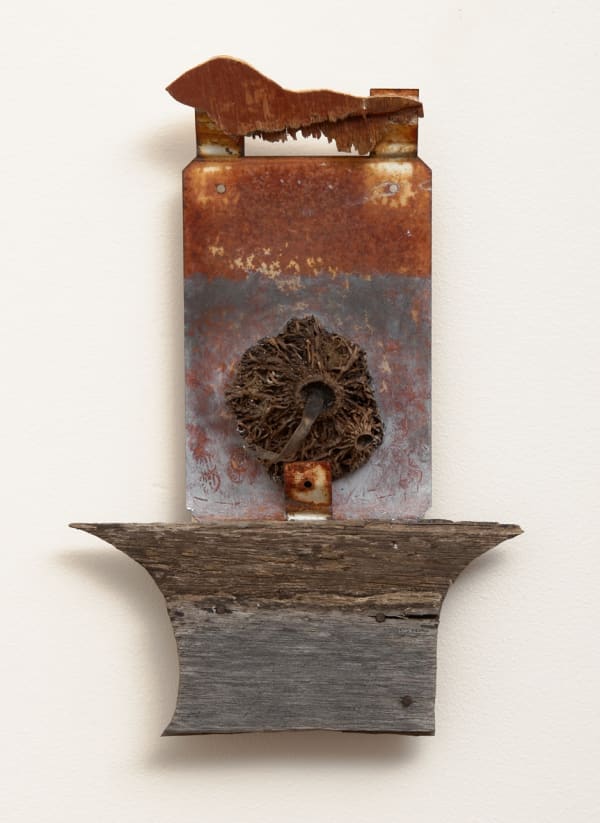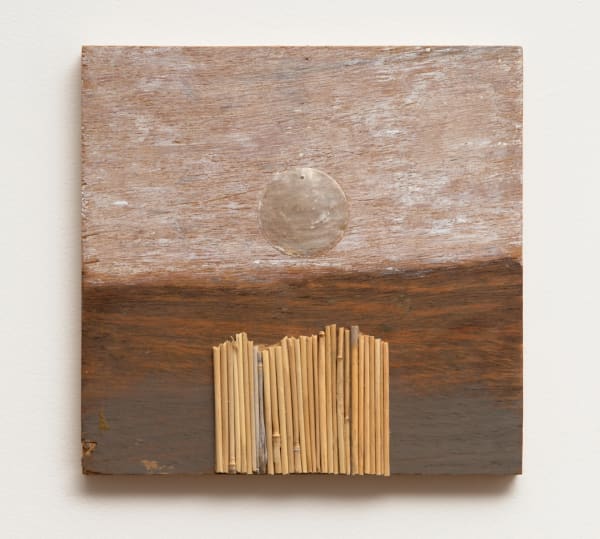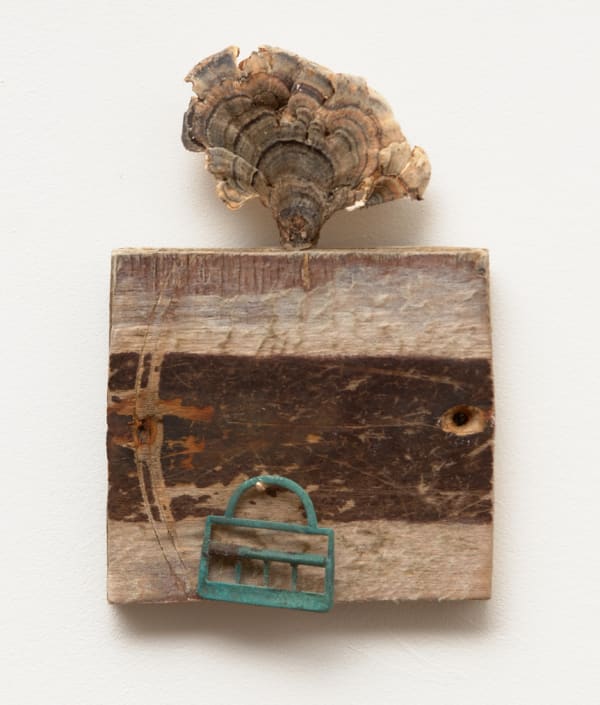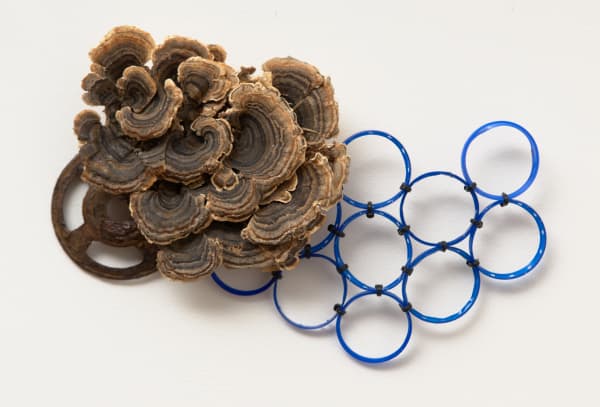Collected Pieces
I had, only that morning, resisted the temptations of Orhan Pamuk’s, The Innocence of Objects, in a city bookshop, and now Irene Briant had put her copy on the dining table. Again, I entered Pamuk’s museum, what he has called the ‘separate realm’ that co-exists with the outside world but is not of it, having its own time – or timelessness – through which to exist.
And so it is with Briant’s Collected Pieces, with these serious yet sometimes surreal arrangements of everyday objects, the thematic groupings, the moments of playfulness within the obsessive ordering of the most banal items into moments, across stretches of time, not necessarily unbroken but suggestive of narrative. For time is the most pervasive ‘object’ here. In the novel that provides the story that is materialised in his museum, Pamuk wrote that, ‘Real museums are places where Time is transformed into Space’. While Briant’s Pieces does not museumify objects, each ‘collection’ reveals to us, spatially, new experiences of those objects.
The process of collection itself takes time: a series of moments is imbued in each item, whether found, contributed or made, included in this body of work. However, as each collection is brought together, these moments are lost in the face of the wider experience of time. In 365 Days the line that denotes each month starts a new series of associations which could form a narrative. For the viewer, correspondences of shape, material, even function, leads the eye across a temporal landscape. For Briant, as maker, there are other associations, with the donors or contributors of objects or fragments, the silent collaborators in the works.
In 1.2.12-31.1.13 the question is asked, ‘When is a good time?’ Seeking the auspicious date, layers of quotations and images are arranged as a calendar in a series of references to Briant’s expertise in textiles (a stitch in time...) through the re-use of remnants from previous work, through fragments of found commercial images and tiny original works. The origins of these grid works are seen in earlier plays on a theme. A single piece of lichen is replicated in 23 other materials; dried vegetables and fruits signal a persistence for living through stasis; circles and their divisions play at the core of existence and natural energies; lizards are measured and imaged; and the presentation of roses is underpinned by their naming texts.
Each collector is after an answer – to an experience, a pain, a longing, and so it must be for the viewers of these collected pieces. A series of four mantelpieces – homes for the mantel clock that chimed its own demise – suggest moments of shack life, outcomes of natural history bivouacs, the long moment that is the experience of Miss Haversham, and the memory piece that seeks something of a grandmother now gone. Each can open a wound or provide solace in the act of viewing.
Pamuk talks of two types of collectors: those show off their collections and who see the museum as the rightful destination of their possessions; and those who simply accumulate. Clearly something separates these collectors then from those who assemble collections precisely for their transformation into, in the case of Briant, works of art. The collections that tell us so much about our experience of time, of how we can live with our own memories through exposure to the memories of others, that allow us to understand through ‘looking like’ that humans share a space that is measured by time understood spatially – these are collections seen anew.
Irene Briant’s Collected Pieces is about objects, rather than illusions. Each moment is caught in an arrangement that obeys a temporal rule, where a concern for placement precedes an intuitive sequencing of each narrative. Like time, each piece has its own texture, dimension, extraordinariness ... and we want to hold it in our hands.
Dr Deborah Malor
April 2013
-
 Irene Briant366 days, 2012mixed media, framed106 x 166 cm (framed size)Sold
Irene Briant366 days, 2012mixed media, framed106 x 166 cm (framed size)Sold -
 Irene Briant1.2.12 – 31.1.13, 2012 - 2013mixed media collage on canvas12 panels: 123 x 165 cm (overall size)AU$ 3,500.00
Irene Briant1.2.12 – 31.1.13, 2012 - 2013mixed media collage on canvas12 panels: 123 x 165 cm (overall size)AU$ 3,500.00 -
 Irene BriantAnimal, vegetable, mineral: Collector’s Mantelpiece, 2013mixed media57 x 150 x 15cmAU$ 3,000.00
Irene BriantAnimal, vegetable, mineral: Collector’s Mantelpiece, 2013mixed media57 x 150 x 15cmAU$ 3,000.00 -
 Irene BriantRemembrance: a Grandmother’s Mantelpiece, 2013mixed media48 x 150 x 15 cm (approx installation size)AU$ 2,500.00
Irene BriantRemembrance: a Grandmother’s Mantelpiece, 2013mixed media48 x 150 x 15 cm (approx installation size)AU$ 2,500.00 -
 Irene BriantSatis: Remembering Miss Havishman, 2013mixed media66 x 150 x 15 cm (approx installation size)AU$ 2,500.00
Irene BriantSatis: Remembering Miss Havishman, 2013mixed media66 x 150 x 15 cm (approx installation size)AU$ 2,500.00 -
 Irene BriantTime Away: Shack Mantelpiece, 2013mixed media55 x 150 x 15 cm (approx installation size)AU$ 2,500.00
Irene BriantTime Away: Shack Mantelpiece, 2013mixed media55 x 150 x 15 cm (approx installation size)AU$ 2,500.00 -
 Irene BriantThe Shape of Lichen, 2013mixed media on Monigami paper, framed in perspex box60 x 80 cm (framed size)Sold
Irene BriantThe Shape of Lichen, 2013mixed media on Monigami paper, framed in perspex box60 x 80 cm (framed size)Sold -
 Irene BriantFood for Thought, 2013mixed media & pencil on Monigami paper, framed in perspex box60 x 80 cm (framed size)AU$ 2,000.00
Irene BriantFood for Thought, 2013mixed media & pencil on Monigami paper, framed in perspex box60 x 80 cm (framed size)AU$ 2,000.00 -
 Irene BriantTime Passed, 2013mixed media on Monigami paper, framed in perspex box60 x 80 cm (framed size)AU$ 2,000.00
Irene BriantTime Passed, 2013mixed media on Monigami paper, framed in perspex box60 x 80 cm (framed size)AU$ 2,000.00 -
 Irene BriantObjets de Vertu, 2012mixed media & wallpaper, framed in perspex box60 x 80 cm (framed size)AU$ 2,000.00
Irene BriantObjets de Vertu, 2012mixed media & wallpaper, framed in perspex box60 x 80 cm (framed size)AU$ 2,000.00 -
 Irene BriantEternity, 2012mixed media on Monigami paper, framed in perspex box60 x 80 cm (framed size)Sold
Irene BriantEternity, 2012mixed media on Monigami paper, framed in perspex box60 x 80 cm (framed size)Sold -
 Irene BriantAs long as a Lizard, 2012mixed media on Monigami paper, framed in perspex box60 x 80 cm (framed size)AU$ 2,000.00
Irene BriantAs long as a Lizard, 2012mixed media on Monigami paper, framed in perspex box60 x 80 cm (framed size)AU$ 2,000.00 -
 Irene BriantHere and There series no.40, 2013mixed media and various found objects29 x 19 x 5.5 cm (object size)Sold
Irene BriantHere and There series no.40, 2013mixed media and various found objects29 x 19 x 5.5 cm (object size)Sold -
 Irene BriantHere and There series no.41, 2013mixed media and various found objects11 x 8 x 3 cm (object size)Sold
Irene BriantHere and There series no.41, 2013mixed media and various found objects11 x 8 x 3 cm (object size)Sold -
 Irene BriantHere and There series no.42, 2013mixed media and various found objects19 x 10 x 2 cm (object size)AU$ 250.00
Irene BriantHere and There series no.42, 2013mixed media and various found objects19 x 10 x 2 cm (object size)AU$ 250.00 -
 Irene BriantHere and There series no.43, 2013mixed media and various found objects25 x 13 x 3 cm (object size)Sold
Irene BriantHere and There series no.43, 2013mixed media and various found objects25 x 13 x 3 cm (object size)Sold -
 Irene BriantHere and There series no.44, 2013mixed media and various found objects63 x 20 x 2 cm (object size)Sold
Irene BriantHere and There series no.44, 2013mixed media and various found objects63 x 20 x 2 cm (object size)Sold -
 Irene BriantHere and There series no.45, 2013mixed media and various found objects52 x 19 x 4 cm (object size)AU$ 450.00
Irene BriantHere and There series no.45, 2013mixed media and various found objects52 x 19 x 4 cm (object size)AU$ 450.00 -
 Irene BriantHere and There series no.46, 2013mixed media and various found objects21 x 22 x 2 cm (object size)AU$ 350.00
Irene BriantHere and There series no.46, 2013mixed media and various found objects21 x 22 x 2 cm (object size)AU$ 350.00 -
 Irene BriantHere and There series no.47, 2013mixed media and various found objects25 x 22 x 2 cm (object size)AU$ 350.00
Irene BriantHere and There series no.47, 2013mixed media and various found objects25 x 22 x 2 cm (object size)AU$ 350.00 -
 Irene BriantHere and There series no.48, 2013mixed media and various found objects35 x 14 x 6 cm (object size)Sold
Irene BriantHere and There series no.48, 2013mixed media and various found objects35 x 14 x 6 cm (object size)Sold -
 Irene BriantHere and There series no.49, 2013mixed media and various found objects18 x 13 x 2 cm (object size)AU$ 300.00
Irene BriantHere and There series no.49, 2013mixed media and various found objects18 x 13 x 2 cm (object size)AU$ 300.00 -
 Irene BriantHere and There series no.51, 2013mixed media and various found objects10 x 16 x 3.5 cm (object size)Sold
Irene BriantHere and There series no.51, 2013mixed media and various found objects10 x 16 x 3.5 cm (object size)Sold -
 Irene BriantHere and There series no.52, 2013mixed media and various found objects18 x 26 x 5 cm (object size)Sold
Irene BriantHere and There series no.52, 2013mixed media and various found objects18 x 26 x 5 cm (object size)Sold -
 Irene BriantHere and There series no.52, 2013mixed media and various found objects18 x 16 x 2 cm (object size)AU$ 350.00
Irene BriantHere and There series no.52, 2013mixed media and various found objects18 x 16 x 2 cm (object size)AU$ 350.00

